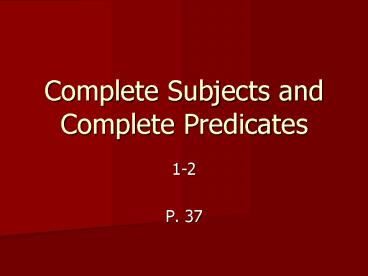Complete Subjects and Complete Predicates - PowerPoint PPT Presentation
1 / 8
Title:
Complete Subjects and Complete Predicates
Description:
Complete Subjects and Complete Predicates 1-2 P. 37 In order to express a complete thought, a sentence must have two parts, a subject and a predicate. – PowerPoint PPT presentation
Number of Views:573
Avg rating:3.0/5.0
Title: Complete Subjects and Complete Predicates
1
Complete Subjects and Complete Predicates
- 1-2
- P. 37
2
- In order to express a complete thought, a
sentence must have two parts, a subject and a
predicate. - The subject tells whom or what the sentence is
about. - The predicate tells what the subject is, does,
has, or feels.
3
Subject Predicate
People eat.
Most people in America eat three meals every day.
4
- The complete subject includes a noun or a pronoun
and the words and phrases that describe it. - The complete predicate contains a verb or a verb
phrase and all the words that complete its
meaning. - Sometimes the complete subject or the complete
predicate or both are just one word. - Fish swim.
5
What are the complete subject and the complete
predicate in each sentence?
- Students in every class are now preparing
projects for the fair. - Two English classes are performing Julius Caesar.
- Some of the students in Ms. Solanos social
studies class have photographed flags of many
nations. - One of the students has built a miniature house.
- Susans class baked whole-wheat bread in the
shapes of hearts and clover leaves.
6
What kind of punctuation mark should end each
sentence? Label each sentence declarative,
imperative, interrogative, or exclamatory.
- 6. Julia has designed colorful programs.
- 7. Students from other schools will be coming.
- 8. We are looking forward to the event.
- 9. The weather had been hot and dry.
- 10. The people of Clayville did not expect a
rainstorm. - 11. The first drops fell at dusk.
- 12. Mist turned to light rain.
- 13. The light rain had become a downpour by dawn.
7
What kind of punctuation mark should end each
sentence? Label each sentence declarative,
imperative, interrogative, or exclamatory.
- 14. A steady rain fell for almost two days.
- 15. The rain was extremely welcome after so many
weeks of dry weather. - 16. Many of the residents of Clayville had been
worried about the lack of rain. - 17. The heavy rainfall produced good results for
the farmers and their summer crops.
8
What kind of punctuation mark should end each
sentence? Label each sentence declarative,
imperative, interrogative, or exclamatory.
- 18. Many plants began recovery.
- 19. Fruit trees produced new buds.
- 20. The children of Clayville also enjoyed the
results of the rain. - 21. Many of the children swam in the pond for the
first time this summer. - 22. Cows, sheep, and goats reaped the benefits of
the lush new growth of grasses. - 23. Everything in the town of Clayville now looks
cleaner, brighter, and practically new. - 24. People with yards can return to watering
their lawns, flower gardens, and vegetable
patches.































